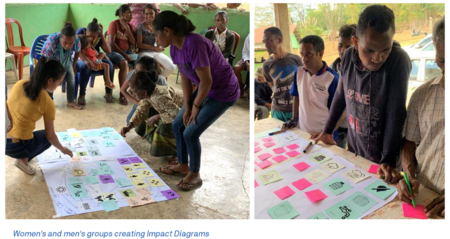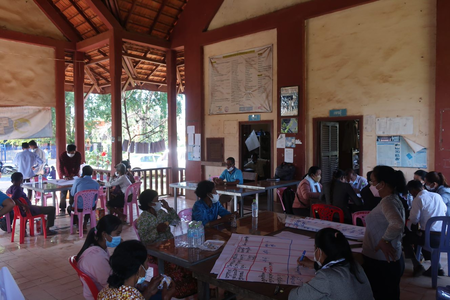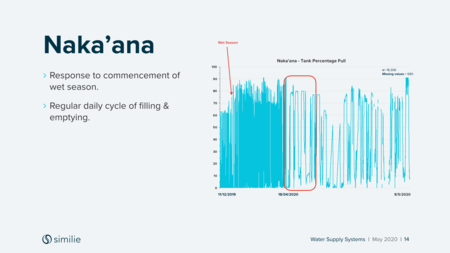Climate resilient WASH: Integrated water management experiences across South East Asia

Climate change is one of the biggest challenges we face in ending the water, sanitation and hygiene (WASH) crisis for everyone, everywhere. It is causing increasingly frequent droughts, floods and extreme weather events throughout the world, but the effects of these are being felt most intensely by the countries who have contributed the least to climate change. These communities are more vulnerable to the effects of climate change due to socioeconomic barriers like limited rural connectivity, weak infrastructure, land disputes, and under resourced governments among others. In the communities we work, we often see a reliance on a single water source which can lead to food insecurity, health problems and conflicts for water. Gender and social inequality is another major challenge across rural areas, where the impacts of climate change on WASH disproportionately affect women and people with disabilities.
Looking forward, we can expect climate change to have an exponential impact on people’s access to basic WASH services through reduced water availability, contamination of water sources, increasing groundwater salinity, damaged infrastructure and increased pressure and disruption of services during extreme events. However, if managed in a sustainable manner, WASH services have the power to transform communities and build resilience against climate change impacts through improved hygiene, reduced disease burden and increased access to clean water in times of scarcity.
WaterAid has been working in Cambodia, Timor-Leste and Papua New Guinea to incorporate integrated water management approaches that focus on optimising and diversifying water sources, addressing water and climate data gaps, increasing community awareness, and supporting local governments to develop water security plans that are adaptive and resilient to climate change. Our key areas of focus include:
- Capacity building and technical awareness among communities and governments around climate change and WASH security;
- Multi-sectoral collaboration to ensure holistic water resource management outcomes;
- Catchment-wide water and climate data management and monitoring processes
Below are some examples of how we are working in these areas to influence national policy agendas and advocating for rights to WASH among broader climate resilience and water resource management planning.
Capacity building and awareness among communities
Holistic WASH and water resource management planning requires capacity building at the community level, including the participation of communities in decision making. Marginalised groups including women, people with disabilities, and elderly people all face a significantly higher amount of difficulty to access clean water and sanitation, but they are most often excluded from decision making processes.
In 2021, Timor-Leste experienced the harsh impacts of climate change with some of the worst flooding in 50 years. WaterAid recently completed a community engagement research project in Timor-Leste in partnership with the University of Technology’s Institute for Sustainable Futures on best practice methods to engage with communities around climate change concepts to increase their knowledge and resilience. This project involved the development of guidelines on how to engage with communities and build awareness around climate change, and aimed to demonstrate the importance of gender and social inclusion in responding to climate hazards. The activities within the guidelines encourage community members to consider who does and who decides during climate events and identify climate risks to their water resources and how these impact people differently. The activities developed through this project are designed to be tailored to each community context and incorporated across different stages of a project cycle. They are now being widely applied in other projects across Cambodia, Timor-Leste and Papua New Guinea.
Multi-sectoral collaboration to achieve holistic outcomes
Cambodia has extremely high exposure to flooding which affects critical sanitation infrastructure, leading to unsafe sanitation practices, contamination of water sources and water borne diseases. One of the most significant barriers to holistic and inclusive WASH service delivery is the lack of coordination between relevant authorities and weak relationships between departments for gathering diverse inputs for policy making. As part of our project funded by the Australian Water Partnership, in Cambodia, a district-wide feasibility study was conducted on water resource management planning that included participation from over 100 stakeholders. These consisted of national and sub-national government agencies, civil society organisations, piped water organisations, academic institutions and development partners. The focus was to foster communication protocols and establish new relationships and collaboration processes. This also included capacity development for the district WASH committee and provincial departments around field practice for water quality testing.
Data monitoring and management to strengthen technical capacity
The lack of relevant climate and water resources data is another key barrier towards understanding current and future climate risks and their impacts on water security. Water supply in rural areas is not reliable year round and is worsening. Irregular monitoring and limited flow of information between water users and local governments also makes it difficult for local bodies to make planning decisions for communities. A key focus area for WaterAid in PNG and Timor Leste is strengthening local data collection and monitoring processes for enhanced future planning.
In collaboration with Similie, WaterAid is working to improve rural community water management through the installation of configurable multipurpose loggers in community water supply tanks. These loggers are installed at various locations in gravity fed systems and provide real time data visualisations on water use patterns and behaviours within a given village. The ultimate purpose of this dataset is to build the capacity of local communities and water managers to monitor, manage and protect their water resources.
As we continue to work across our country programs, climate resilient water resource management and advocating for rights to WASH remains a key focus area. Our work is continuing to create meaningful relationships across institutions to foster holistic policy development, increase technical capacity and build awareness around the importance of climate resilient WASH.
Written by Tanvi Oza (Regional Climate Change Advisor) and Caity Hall (Communications Manager)


